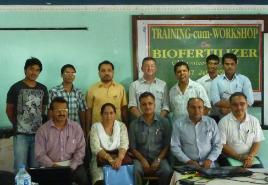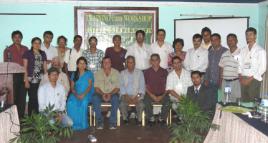Nepal explores biofertiliser projects, with help from CQUni
Published on 22 August, 2012
CQUniversity has teamed with a Nepalese institution to address problems of urban and agricultural waste management...
An R&D project funded by AusAID until 2014 aims to develop appropriate technologies for sustainable management of fruit and vegetable wastes produced in wholesale markets, and poultry wastes produced from the fast-growing poultry industry in the country.
CQUniversity's Centre for Plant and Water Science has teamed with Tribhuwon University's Institute of Agriculture and Animal Science (IAAS) in Nepal through a project lead by Professor David Midmore.
The project focuses on capacity development (postgraduate training), transfer of knowledge and technologies, and support for industry development for sustainable waste management.
Project activities are coordinated by CQUniversity Research Fellow Dr Surya Bhattarai in Australia and IAAS Professor Durga D Dhakal in Nepal.
"The project is very timely given the current situation in the country where future acute shortage of chemical fertilisers for major crop production will lead to major socio-economic problems for the country," Dr Bhattarai says.

Participants in a poultry waste management training session
"This collaborative project started some pilot testing aimed to develop biofertiliser from fruit and vegetable wastes employing vermi-technologies (using worms) and converting poultry waste into high-value granular fertilisers. These can potentially contribute to minimise the chronic fertiliser shortage in the country."
Dr Bhattarai says that, as part of capacity building, 10 postgraduate student researchers and their supervisory teams have been linked with the project activities.
"For skill and knowledge transfer, an introductory and joint workshop and training was conducted in Chitwon, Nepal, during July, involving reputable resource persons from Australia who are world leaders on vermi-composting (Vermicrobe International) and poultry litter processing (FEECO International).
"Vermicrobe International consultant Dave Wyatt presented training on use of vermi-technologies from fruit and vegetable waste management, whereas FEECO International consultant Barry Wilson presented training on processing of poultry waste for manufacturing of granules and agglomerates.

Prof David Midmore (left) and Dr Surya Bhattarai
"Both training sessions comprised classroom presentations, activities and discussions, followed by a day-long visit/meeting with industries and businesses from composting sectors. These highly interactive and industry-focused workshops attracted research higher degree candidates from IAAS, their supervisors, NGO representatives, chambers of industry and commerce, business people, staff from the government Department of Agriculture and Nepal biogas program, and enthusiastic growers."
Dr Bhattarai says 10 postgraduate student studies are already planned and initiated in areas including: vermi-composting of fruit and vegetable wastes; evaluations of short and long-term effects of vermicast and vermi-liquor on crops and soils; composting of poultry litter; socio-economic evaluations and adoptions of vermi-composting in Nepal; and areas associated with monitoring and measurement of worms' activities in different land management systems.
The group identified seven different scales of vermi-composting facilities for Nepal (household, community, corporate, small traders, medium traders, wholesaler and industrial processing). Research activities have already started for evaluation of household, small traders and industrial processing operation systems for recycling of fruit and vegetable waste from one of the wholesale market centres in Chitwon. The vermi-composting activities will focus on fruit and vegetable markets in Chitwon, Pokhara and Kathmandu over the project period.
Meantime, the poultry litter processing activities and research are concentrated in Chitwon. A granulation plant will be established by end of 2012 in Chitwon with the technical support from FEECO International.
"Capacity development will also underpin the creation of laboratory facilities in IAAS that will eventually develop into the National Centre for Biofertiliser Research and Development," Dr Bhattarai says.


